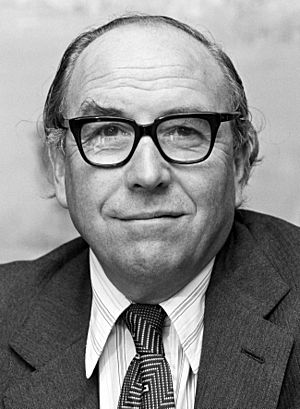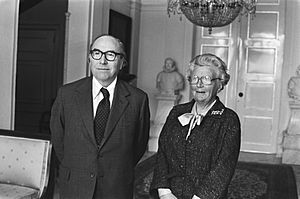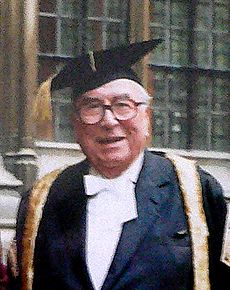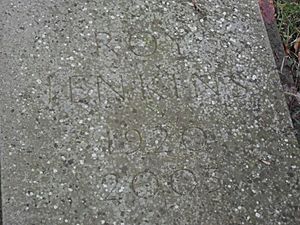Roy Jenkins facts for kids
Quick facts for kids
The Lord Jenkins of Hillhead
|
|||||||||||||||||||||||||||||||||||||
|---|---|---|---|---|---|---|---|---|---|---|---|---|---|---|---|---|---|---|---|---|---|---|---|---|---|---|---|---|---|---|---|---|---|---|---|---|---|

Jenkins in 1977
|
|||||||||||||||||||||||||||||||||||||
| Chancellor of the University of Oxford | |||||||||||||||||||||||||||||||||||||
| In office 14 March 1987 – 5 January 2003 |
|||||||||||||||||||||||||||||||||||||
| Vice‑Chancellor |
|
||||||||||||||||||||||||||||||||||||
| Preceded by | The Earl of Stockton | ||||||||||||||||||||||||||||||||||||
| Succeeded by | The Lord Patten | ||||||||||||||||||||||||||||||||||||
| President of the European Commission | |||||||||||||||||||||||||||||||||||||
| In office 6 January 1977 – 19 January 1981 |
|||||||||||||||||||||||||||||||||||||
| Preceded by | François-Xavier Ortoli | ||||||||||||||||||||||||||||||||||||
| Succeeded by | Gaston Thorn | ||||||||||||||||||||||||||||||||||||
| Home Secretary | |||||||||||||||||||||||||||||||||||||
| In office 4 March 1974 – 10 September 1976 |
|||||||||||||||||||||||||||||||||||||
| Prime Minister | |||||||||||||||||||||||||||||||||||||
| Preceded by | Robert Carr | ||||||||||||||||||||||||||||||||||||
| Succeeded by | Merlyn Rees | ||||||||||||||||||||||||||||||||||||
| In office 23 December 1965 – 30 November 1967 |
|||||||||||||||||||||||||||||||||||||
| Prime Minister | Harold Wilson | ||||||||||||||||||||||||||||||||||||
| Preceded by | Frank Soskice | ||||||||||||||||||||||||||||||||||||
| Succeeded by | James Callaghan | ||||||||||||||||||||||||||||||||||||
| Chancellor of the Exchequer | |||||||||||||||||||||||||||||||||||||
| In office 30 November 1967 – 19 June 1970 |
|||||||||||||||||||||||||||||||||||||
| Prime Minister | Harold Wilson | ||||||||||||||||||||||||||||||||||||
| Chief Secretary | Jack Diamond | ||||||||||||||||||||||||||||||||||||
| Preceded by | James Callaghan | ||||||||||||||||||||||||||||||||||||
| Succeeded by | Iain Macleod | ||||||||||||||||||||||||||||||||||||
|
|||||||||||||||||||||||||||||||||||||
|
|||||||||||||||||||||||||||||||||||||
|
|||||||||||||||||||||||||||||||||||||
|
|||||||||||||||||||||||||||||||||||||
| Personal details | |||||||||||||||||||||||||||||||||||||
| Born |
Roy Harris Jenkins
11 November 1920 Abersychan, Monmouthshire, Wales |
||||||||||||||||||||||||||||||||||||
| Died | 5 January 2003 (aged 82) East Hendred, Oxfordshire, England |
||||||||||||||||||||||||||||||||||||
| Political party |
|
||||||||||||||||||||||||||||||||||||
| Spouse |
Mary Jennifer Morris
(m. 1945) |
||||||||||||||||||||||||||||||||||||
| Children | 3 | ||||||||||||||||||||||||||||||||||||
| Parent | Arthur Jenkins (father) | ||||||||||||||||||||||||||||||||||||
| Alma mater |
|
||||||||||||||||||||||||||||||||||||
| Military service | |||||||||||||||||||||||||||||||||||||
| Allegiance | United Kingdom | ||||||||||||||||||||||||||||||||||||
| Branch/service | |||||||||||||||||||||||||||||||||||||
| Rank | Captain | ||||||||||||||||||||||||||||||||||||
| Unit | Royal Artillery | ||||||||||||||||||||||||||||||||||||
| Battles/wars | Second World War | ||||||||||||||||||||||||||||||||||||
Roy Harris Jenkins, Baron Jenkins of Hillhead (11 November 1920 – 5 January 2003) was an important British politician. He served as the President of the European Commission from 1977 to 1981. He was a Member of Parliament (MP) for different political parties. These included the Labour Party, the Social Democratic Party (SDP), and the Liberal Democrats. He also held major government jobs like Chancellor of the Exchequer (in charge of the country's money) and Home Secretary (in charge of law and order).
Roy Jenkins was the son of Arthur Jenkins, who was a coal miner and also a Labour MP. Roy studied at the University of Oxford and worked as an intelligence officer during the Second World War. He was first elected as an MP in 1948.
Contents
Roy Jenkins: A British Politician
Roy Jenkins was a key figure in British politics for many years. He was known for his calm approach and his belief in working with other countries. He helped shape many laws and policies in the UK and in Europe.
Early Life and Education
Roy Jenkins was born in Abersychan, a town in Monmouthshire, Wales. He was an only child. His father, Arthur Jenkins, was a trade union official and a Labour MP. Roy's mother, Hattie Harris, was the daughter of a steelworker.
Roy went to Pentwyn Primary School and Abersychan County Grammar School. He then studied at University College, Cardiff, and later at Balliol College, Oxford. At Oxford, he earned a top degree in Politics, Philosophy, and Economics. During the Second World War, Jenkins trained as an officer. In 1944, he was sent to Bletchley Park, where he worked as a codebreaker.
Starting His Political Journey
After the war, Roy Jenkins tried to become an MP in 1945 but did not win. He then worked for a short time in finance. In 1948, he was elected to the House of Commons as an MP for Southwark Central. He was the youngest MP at the time. In 1950, he became the MP for Birmingham Stechford, a seat he held until 1977.
In his early career, Jenkins wrote books and articles about politics. He believed in making society fairer and helping those in need. He also supported Britain joining the European Communities, which was a group of European countries working together.
Making Changes as Home Secretary
In 1964, when Harold Wilson became Prime Minister, Jenkins was made Minister of Aviation. A year later, in 1965, he became Home Secretary. This was a very important job, as he was in charge of law and order in the country. Roy Jenkins wanted to create a "civilised society."
During his time as Home Secretary, he brought in many important changes:
- He helped end capital punishment (the death penalty) in Britain.
- He ended theatre censorship, meaning plays no longer needed approval from the government.
- He made homosexuality less of a crime.
- He made divorce laws easier.
- He stopped birching (a type of physical punishment).
- He also introduced police reforms, making forces more modern with new radios.
- He worked to prevent racial discrimination with the Race Relations Act 1968.
Many people saw him as a rising star in the government because of these changes.
Managing the Economy as Chancellor
In 1967, after a money crisis, Jenkins became Chancellor of the Exchequer. This meant he was responsible for the country's finances. His main goal was to make the economy stable and help it grow. He made tough decisions, including raising taxes significantly in 1968. These actions helped the government's finances improve.
After the Labour Party lost the 1970 election, Jenkins became the Deputy Leader of the Labour Party. However, he later resigned in 1972 because he strongly supported Britain joining the European Communities, while his party was against it.
In 1974, when Labour returned to power, Jenkins became Home Secretary again. During this second time, he continued to work on social reforms. He helped pass the Sex Discrimination Act 1975, which aimed for gender equality. He also supported the Race Relations Act 1976, which further outlawed racial discrimination.
He played a big role in the 1975 vote on whether Britain should stay in the European Economic Community (EEC). He campaigned strongly for Britain to remain a member, and the 'Yes' campaign won.
A Leader in Europe
In 1976, Roy Jenkins left British politics to become the President of the European Commission. This was a very important job in Europe. He was the first British person to hold this position.
One of his biggest achievements as President was helping to create the European Monetary System. This system was a step towards the idea of a single European currency, which later became the Euro. He believed that working together on money matters would make Europe stronger and more stable.

Forming a New Political Party
After his time in Europe ended in 1981, Jenkins returned to British politics. He was unhappy with the direction the Labour Party was taking. He joined with three other senior Labour figures, known as the "Gang of Four." Together, they started a new party called the Social Democratic Party (SDP).
In 1982, Jenkins won a special election to become an MP again for Glasgow Hillhead. He became the leader of the SDP. For the 1983 election, the SDP formed an alliance with the Liberal Party. After the election, he stepped down as leader. He lost his seat in Parliament in 1987.
Later Life and Achievements
After leaving the House of Commons, Roy Jenkins became a member of the House of Lords in 1987. He was given the title Baron Jenkins of Hillhead. In the same year, he was also elected Chancellor of the University of Oxford, a role he held until his death.
He continued to be involved in politics and public life. He advised Prime Minister Tony Blair in the late 1990s. He also led a special group called the "Jenkins Commission" to look at different ways of voting in the UK.
Besides politics, Roy Jenkins was also a well-known historian and writer. He wrote many books, including biographies of famous figures like Gladstone and Winston Churchill. His autobiography, A Life at the Centre, is still enjoyed by many readers.
Roy Jenkins died on 5 January 2003, at the age of 82. He was remembered as a politician with great intellect and vision.
Family Life
On 20 January 1945, Roy Jenkins married Mary Jennifer Morris. They were married for almost 58 years. She was later honored for her work with historical buildings. They had two sons, Charles and Edward, and a daughter, Cynthia.
Books by Roy Jenkins
- Roosevelt. Pan Macmillan. 2005. ISBN 0-330-43206-0.
- Churchill: A Biography. Macmillan. 2001. ISBN 0-333-78290-9.
- The Chancellors. Macmillan. 1998. ISBN 0-333-73057-7.
- Gladstone. Macmillan. 1995. ISBN 0-8129-6641-4.
- Portraits and Miniatures. Bloomsbury. 1993. ISBN 978-1-4482-0321-5.
- A Life at the Centre. Macmillan. 1991. ISBN 0-333-55164-8.
- European Diary 1977-81. Collins. 1989.
- Gallery of Twentieth Century Portraits and Oxford Papers. David & Charles. 1988. ISBN 0-7153-9299-9.
- Truman. HarperCollins. 1986. ISBN 0-06-015580-9. https://archive.org/details/truman00jenk.
- Baldwin. Collins. 1984. ISBN 0-00-217586-X.
- Nine Men of Power. Hamish Hamilton. 1974. ISBN 978-0241891384.
- Asquith. Collins. 1964. ISBN 0-00-211021-0. https://archive.org/details/asquith0000jenk., revised edition 1978
- Essays and Speeches. Collins. 1967. https://archive.org/details/essaysspeeches0000jenk.
- The Labour Case. Penguin. 1959. https://archive.org/details/thelabourcase1959.
- Sir Charles Dilke: A Victorian Tragedy. Collins. 1958. ISBN 0-333-62020-8., revised edition 1965
- Mr. Balfour's Poodle: Peers v. People. Collins. 1954. OCLC 436484.
- Pursuit of Progess: a Critical Analysis of the Achievement and Prospect of the Labour Party. Heinemann. 1953.
- Mr. Attlee: an Interim Biography. Heinemann. 1948.
See also
 In Spanish: Roy Jenkins para niños
In Spanish: Roy Jenkins para niños
 | Laphonza Butler |
 | Daisy Bates |
 | Elizabeth Piper Ensley |



